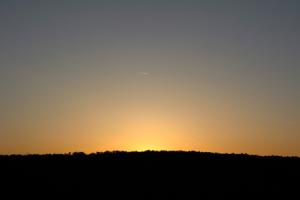
Last week when I saw this article about nearly 1/3 of the Chesapeake Bay being a “dead zone” this year, it felt like someone punched me in the gut. I made some kind of audible groaning sound and reeled—as much as that’s possible while sitting in a chair at the kitchen table. For this native Texan who’s lived in the Lone Star State her whole life (except for a nine-month stint in New Orleans when I was five) to be so moved by environmental trauma in another part of the country might seem odd. I mean, there are environmental traumas happening every day all around the world. Why does this one make me want to curl into a little ball of wounded sorrow?
A couple of summers ago, I had the great privilege to participate as a Young Adult Fellow in the Faith and Eco-Justice Fellowship program of the National Council of Churches. About 20 young leaders from around the country met in Annapolis, MD, and traveled by car—and then by boat—out to a tiny, tiny island in the middle of Chesapeake Bay for a three-day retreat. During that time, we learned together, ate together, prayed together and immersed ourselves in the Bay together—quite literally! In the mud of the salt marsh and in the water itself, we really experienced the Chesapeake.
Dr. Sallie McFague, in Super, Natural Christians: How We Should Love Nature, says in various ways the following: “We will not save what we do not love, and we cannot love what we do not know.” Because I got to know a slice of the Chesapeake Bay ecosystem—plant, land, water, bird, fish, human—I grew to love it. So when I see that 1/3 of the Bay is dead this year, it’s not some far-off, abstract ecosystem for me. It’s slender green reeds by the shore that reflect ripples of morning sunshine in bands of light; it’s the “watermen” (and a few women) of Tangier Island who speak with what must be a modern-day Elizabethan accent; it’s the crab that bit me so hard and wouldn’t let go that we had to pry him off my hand.
“No one loves the whole earth except as she or he loves a particular part of it,” McFague writes. I’d say she’s right; my love of the Chesapeake Bay (and some other places I know) informs my concern for the whole earth. From Rabbi Arthur Green’s book, Radical Judaism, I learned a strikingly similar teaching in an interpretation of an ancient midrash. The midrash states: “Anything that belonged to a particular category and then became exceptional to that category did so in order not only to teach about itself but also to instruct with regard to the entire category.” The Sefat Emet, Green says, applied this teaching to broad categories; so, for example:
Shabbat was within the category of days. When it became exceptional, it did so not only to teach us of the Sabbath but to show us how to regard time during the week as well, how to make the weekday sacred. The Land of Israel is within the category of lands; when it was proclaimed holy and thus made exceptional, we were to learn also about the holiness of the land itself, not just this particular one. So too the people of Israel: our election comes to indicate the potential holiness of all peoples, not just our own.
Clearly, we have not yet learned this lesson that all days are sacred, all lands sacred, all people sacred. Widespread environmental degradation; budget cuts for basic social services at local, state and federal levels all across the country; and rising inter-religious tension are just some examples of our disconnection from both the natural world and from each other—signs and symptoms of our brokenness. In so many ways, the planet that we share and humanity as a whole cries out for attention, love and healing.
If it is true that universal love is learned through the development of particular love, though, there are simple things that each of us can do to bring more healing and love into the world. McFague writes, “Love and knowledge go together; we can’t have the one without the other.” To increase love and connection, then, we must reach out and get to know something, or someone, beyond ourselves—and through knowing, come to love.
So please, get to know a wild natural place somewhere close-by. Pay attention to its trees, its grasses, its birds and the way that the sunlight plays on the water (or the hillside, or the mountain). Make connections also with people—people who live on the other side of town, or who are older than you, or younger than you, or a different ethnicity, or a different religion, or who make less money. If the theologians and sages are right, then any healing and connection and love we create will expand into larger, more universal healing and connection and love—and God knows, the world and our human hearts could use more of that.
McFague contends that, “We will not save what we do not love.” Let us grow to love more, then, so that we might save something of this beautiful planet, Chesapeake Bay included—and learn to live with each other in peace.
This essay originally appeared in the State of Formation journal.

